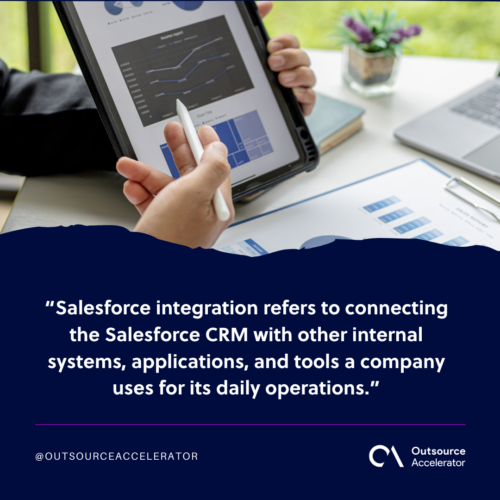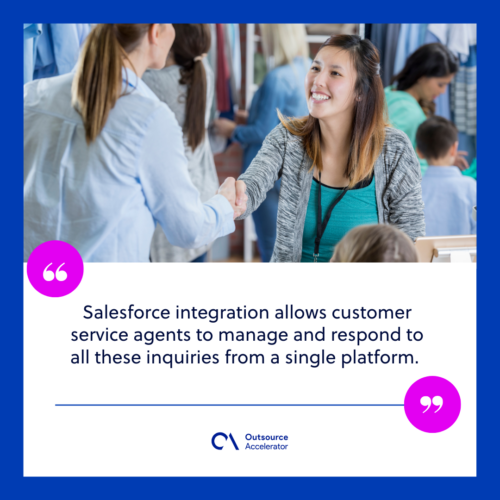How Salesforce integration can streamline customer service processes

Customer service is the cornerstone of a successful business, setting the tone for customer loyalty and brand reputation. With increasing customer expectations, organizations need seamless, efficient ways to respond to and engage with clients.
Salesforce is a prominent customer relationship management (CRM) platform. The software empowers businesses to elevate customer service by integrating key processes, technologies, and data.
This integration enables companies to streamline service workflows, enhance customer interactions, and ultimately, improve satisfaction.
In this article, we look at how Salesforce integration can transform customer service processes and how Itransition can help.
What is Salesforce integration?
Salesforce integration refers to connecting the Salesforce CRM with other internal systems, applications, and tools a company uses for its daily operations.
It centralizes customer data, communication channels, and service workflows, allowing service representatives to access all relevant customer information in one place.
Salesforce integration links the system to various platforms, including ERP systems, e-commerce sites, or social media networks. Companies can create a unified view of customer interactions, preferences, and past issues.
This setup minimizes the need for employees to switch between tools and ensures that data remains consistent and up-to-date across all platforms.

Salesforce integration and customer service processes
Salesforce integration enhances customer service in several powerful ways:
1. Automating service workflows
Salesforce’s automation capabilities enable businesses to streamline repetitive tasks, such as:
- Ticket routing
- Follow-up reminders
- Case status updates
When a customer submits a service request, Salesforce can automatically assign it to the right representative based on predefined rules like issue type, agent availability, or customer priority.
This eliminates manual sorting, accelerates response times, and frees up agents to focus on more complex issues.
2. Personalized customer interactions
With Salesforce integration, service agents have a complete view of each customer’s history and interactions.
Integrating data from e-commerce, support tickets, and social media allows agents to see past purchases, previous issues, and customer preferences. This information helps agents tailor responses to each customer.
Interactions are more meaningful and reduce the need for customers to repeat information.
3. Real-time data synchronization
Salesforce integration enables real-time data updates across platforms, ensuring that all customer information is current and accessible.
For instance, if a customer updates their contact information or makes a new purchase, this data is immediately available to service agents. This reduces the chances of errors and lets agents address issues with the latest information.
4. Enhanced case management
Salesforce’s case management tools are more effective when integrated with other service systems. Agents can quickly access the right resources—like a product database or troubleshooting guide—directly from the Salesforce platform.
By integrating Salesforce with knowledge management systems, agents can increase first-contact resolution rates and boost customer satisfaction.
5. Multichannel communication management
Today’s customers expect support across multiple channels, from email and phone to chat and social media. Salesforce integration allows customer service agents to manage and respond to all these inquiries from a single platform.
This improves response times and ensures consistency, as all messages and records are tracked in one place.

Key benefits of Salesforce integration for customer service
Integrating Salesforce into customer service processes delivers a range of benefits:
- Efficiency gains – Automating repetitive tasks and reducing manual input let agents work more efficiently, leading to faster issue resolution.
- Improved customer satisfaction – With real-time data access, personalized interactions, and faster service, customers receive a smoother experience, which enhances satisfaction and loyalty.
- Data-driven decision-making – Centralized customer interactions and data help companies analyze trends, identify recurring issues, and make data-backed improvements to the service process.
- Enhanced collaboration – Salesforce integration fosters a more collaborative environment where customer data is easily accessible across the organization, ensuring cohesive customer engagement.
Itransition’s Salesforce expertise
When it comes to Salesforce integrations, expertise is key. Itransition offers extensive experience in configuring, customizing, and deploying Salesforce solutions to meet unique business needs.
Itransition’s team of certified Salesforce experts works closely with organizations to design tailored integrations that support specific customer service goals.
Look no further than Itransition if you’re aiming to maximize the value of your Salesforce investment!







 Independent
Independent




